So you’ve just joined a samba band, and you love it. Maybe it’s our samba band! We supply all the drums, straps, and sticks you need to get started. But if you do want to invest in your new hobby, where’s the best place to start? Here’s our advice on what to get for yourself if you want your own equipment, particularly for Batida Rio.
Hearing Protection
Without a doubt, the first thing you should consider is hearing protection. Samba is loud – especially indoors – and without hearing protection, there’s a risk of developing tinnitus or hearing loss over time.
Foam earbuds offer a broadband 30dB of reduction, and they’re cheap, but they’re typically single-use. A better alternative is musician’s earplugs, like these Alpine Musician’s earbuds, which contain specific filters.
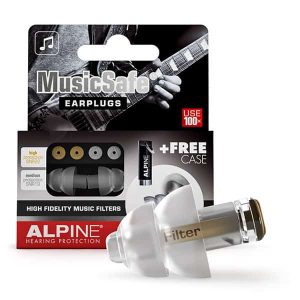
Straps
While most bands will also provide these, the best ones can often go quickly, meaning you’re left with the ‘b-stock’ which may not fit properly. Investing in your own strap, adjusted and comfortable to you, will make rehearsals – and performances – much more comfortable.
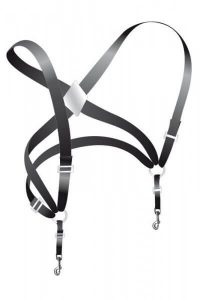
Batida Rio holds various sizes of the Kalango waist strap, which is designed to go around the waist and fits all our instruments. For surdos, you may instead choose a shoulder harness, which shifts the weight from your lower back to your whole back. For caixas, an alternative is a single over-the-shoulder strap. These straps offer no real benefits over a waist strap but change the playing position of the drum. We recommend the Kalango straps for caixas and repiniques.
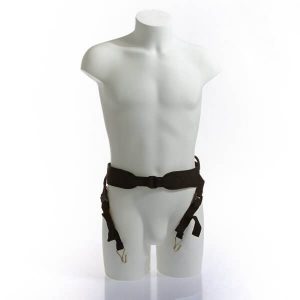
Sticks/Beaters
You might want your own sticks or beaters for the same reason as a strap – you can find a size that’s comfortable to you and have something that’s ready to go when you arrive.
Batida Rio provides standard sticks and beaters for all drums and specifically purchase Ivsom surdo beaters in blue to match the surdos. We recommend Ivsom and Liverpool brands, and Promark sticks for caixas. For repinique, we recommend Liverpool nylon repinique sticks or ‘whippy sticks’. For tamborim, Liverpool also makes some great 3 or 5 strand tamborim beaters in various lengths.
Hand and Leg Protection
If you’re not used to playing, and you play with a good amount of energy, you may find you develop blisters on your hands. Your hands will callous over time but it’s not comfortable!
Drumming gloves are ideal, but any fingerless gloves with leather palm protection will help a lot.
For surdos, there’s another problem; shins. Particularly when moving, surdos will bash against legs and can cause discomfort over time. An easy way to mitigate this is soft knee pads (like volleyball knee pads), and football shin guards. Skater or BMX protection is too bulky.
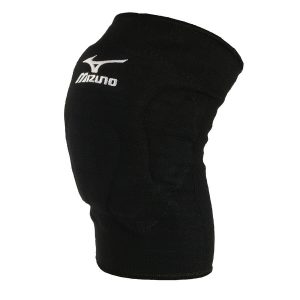
Drums
So you’re going all out and getting your own drum? Great! There’s a wide range available, and Batida Rio focuses on specific tried and tested brands for each section of our bateria.
Remember that if you’re buying you’re buying your own drum, you’ll also need your own sticks/beaters and straps as there’s no guarantee Batida Rio will have a strap and sticks for additional drums.
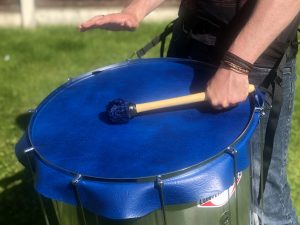
For surdos, we specifically use Contemporanea Pro compact surdos. They’re lightweight, and their shallower depth means they’re easier to use on performances. We double-head our surdos using blue leatherette napa. It’s important to us that our surdos match for tuning and size, and that we maintain a good balance of the three sizes we use. We recommend speaking to us before buying your surdos for use in the band, particularly if you want your own surdo for performances. (You might have noticed we also have Gope longer surdos in our rehearsals – these will eventually be phased out.) These surdos can cost anything between £150 – £250 depending on the size.
https://www.kalango.com/en/surdo-axe-22-x-43-cm-contemporanea-c-axe22?c=543
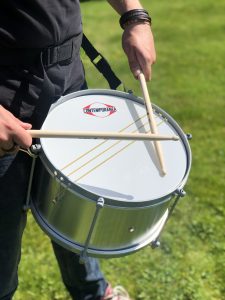
Our caixas are a mixture of Ivsom caixas de guerra, and Contemporanea Pro Caixas. Both are great options, and the only caixas we would take to a performance. We would recommend either of these options when purchasing a Caixa. These caixas are typically between £80 – £120.
https://www.kalango.com/en/caixa-de-guerra-12-x-17-cm-aluminium-ivsom-a110214?c=479
https://www.kalango.com/en/malacacheta-12-x-20-cm-contemporanea-c-ca03?c=479
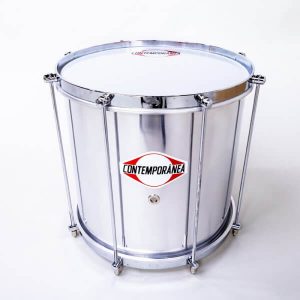
For Repiniques, we again recommend Ivsom or Contemporanea. We recommend 12″ for most adults, 10″ are also available for smaller arms. Again, these are typically £100 – £120.
https://www.kalango.com/en/repinique-12-x-30-cm-pro-contemporanea-c-rep03?c=533
https://www.kalango.com/en/repinique-12-x-27-cm-ivsom-a110613?c=533
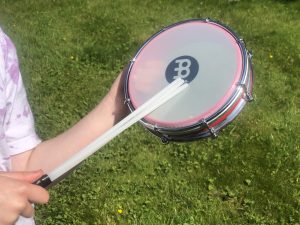
Tamborims are the cheapest investment, and Batida Rio recommends any proper Brazilian tamborim. They are typically between £10 – £20.
https://www.kalango.com/en/tamborim-6-aluminium-light-contemp.-light-cl-tam01?c=550
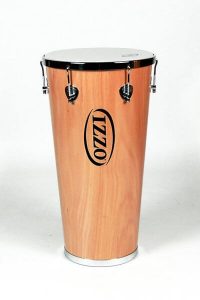
We also use Timbal in our group. Izzo has the best range, with various sizes. We recommend a depth of 50cm or 70cm for most players, as the longer 90cm can be difficult to play and move with.
https://www.kalango.com/en/timbal-14-x-70-cm-wood-contemporanea-ctib01?c=557
Other drums
In our rehearsals, we also use some support instruments, particularly when we’re busy! These include chocalho (a type of shaker with metal discs), shakers and agogo bells. Again, we recommend our members obtain drums from the list above rather than ancillary instruments.
We use some additional items during particularly busy times, but these will be phased out in time.
Instruments we don’t use
So please don’t buy/bring them, as we won’t have rhythms for you! These include some Brazilian instruments from other styles. We very specifically use shallow aluminium surdos and don’t use nesting surdos or other types in our bateria. We don’t use non-Brazilian instruments like marching snares, djembes, tambourines, woodblocks and so on.
What should I get to practice on?
If you’re just looking for a solution for home practice, there are plenty of options!
1. Buy your own drum. The most expensive solution, but you’ll have your own instrument to use. For the home, it doesn’t have to be an actual samba drum – second-hand floor toms from drum kits work as surdos, and a rack tom can be tightened and used as a repinique. Any snare can be used to practice rhythms.
2. Buy a practice pad. This is particularly useful for Caixa and repinique players as practice pads have a bit of bounce in them.
3. Build your own drum! Probably the most fun solution, you can stretch cling film over a commercial food tin and you have a good start! It can be as simple or as complicated as you like, and making drums can be a fun experience for the whole family!
Where should I buy from?
There are many places in the UK that stock samba instruments, but the brands and stock levels can vary. For the instruments we use, we recommend the following stores;
Kalango – a huge EU supplier and the go-to for many bands across Europe.
Knock on Wood – A UK-based supplier which specialises in samba instruments among other things.
eBay – You can always try second hand, though it’s likely a used drum will require new skins or may have some damage.
If in doubt, drop us a message, and we’ll be happy to help.
0 Comments